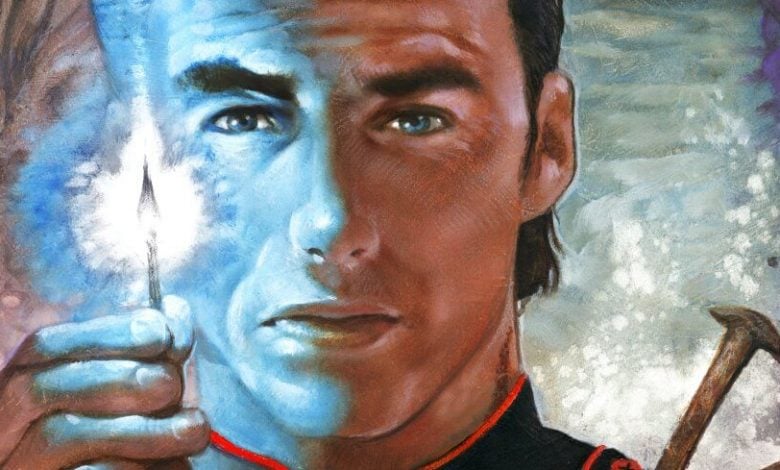‘Soulfinder’ Hopes to Shame Comic Book Groupthink

Douglas Ernst spent years bemoaning the comic book industry’s creative decline.
So he finally decided to do something about it. Earlier this year he created an Indiegogo.com campaign for “Soulfinder: Demon’s Match.” The comic title eschewed the progressive messaging found in too many comic titles.
The focus, Ernst says, is on the story … the way it should be.
“Soulfinder: Demon’s Match” follows a group of combat veterans who battle an evil force overtaking a sleepy Maryland town.
This reporter caught up with Ernst to discuss “Soulfinder’s” origin story and why he fought so hard for to make his story as authentic as possible.
Hollywood in Toto: Tell me about the story behind the story — what inspired you to concoct “Soulfinder: Demon’s Match” initially?
Douglas Ernst: It’s in many ways the culmination of roughly a decade of frustration with the comic book industry. Partisan politics are jammed into books, the “pros” insult readers who have a love and reverence for the classic hero’s journey and moral relativism steers the ship. Pitting combat veterans turned exorcists up against demons allowed me to tell the Good vs. Evil tale that so many readers have been denied for years.
I blogged and published Youtube videos on the intersection of politics and popular culture since 2010, but I felt like I wasn’t truly inside the cultural arena until I was writing and publishing my own stories. I wanted to give others a product that they could rally behind while saying to industry insiders: “This is the kind of effort we expect out of creators on a regular basis.”
HiT: Exorcist-style stories often run into a roadblock … the 1973 movie remains the gold standard in the genre. How does “Soulfinder” connect with that film’s spirit?
Ernst: One of the many reasons why “The Exorcist” is still admired decades after its release is because it’s obvious that key decisionmakers did their homework.
Certain elements — often copied and overused to this day — were exaggerated for the big screen, but the basics were sound. I did a lot of research with “Soulfinder” to make sure I could speak with authority on the matter. While the aim was first and foremost to tell an exciting story, it was important to treat the subject matter seriously.
If the book is well received once it lands in customers’ hands, that’s great. I would also be thrilled, however, if one day I hear from a priest who says, “You did your homework. Kudos.”
Our team tried our best to honor the creative elements that made the original great, while also avoiding those that have become a bit cliché.
HiT: So many comic book creators are aghast at how political the medium has become … when did you notice this trend, and do you know of any forces within the industry hoping for a return to form?
Ernst: I first started to seriously cover the industry’s rabid ideologues roughly a decade ago, although in many ways the problem is a bit older. I think social media platforms played a huge role in warping psychological incentives, in that writers, editors, and artists realized that they could get more attention if they became activists masquerading as artists. They appear to have an addiction to the likes and retweets and shares that often come with being an ideologue.
There may be some individuals within the industry who would like a return to form. In general, however, they keep their lips zipped. Cultural termites have infested Marvel, DC, and Image. The only significant forces for change exist outside the industry. Two men in particular who are leading the charge are on my Soulfinder team — artist Timothy Lim and colorist Brett R. Smith.
Dave Dorman, an industry legend, also did two covers for us.
HiT: Once the campaign wraps … will readers be able to pick “Soulfinder” up at their local comic book shop? Or will there be other ways to pick it up?
Ernst: We’re working on getting the book into shops. On some level, the success of this campaign will determine what happens on that front. It’s a risk for a small publisher to go to bat for a guy like me. Any publisher who puts Soulfinder into shops is going to receive a certain amount of blowback.
Having strong sales for this campaign goes a long way toward easing the publisher’s mind. If conservatives want to change the culture, then they need to realize the importance of supporting budding artists and writers in their midst.
I do plan on making the book available via online retailers at some point. For now, though, I’m focused on delivering the graphic novel on time — or early — to our Indiegogo backers.
HiT: Many right-leaning artists are going independent — with impressive results. Is this the model for the foreseeable future, given the roadblocks put in place by liberal gatekeepers? Or do you see other paths forming for artists like yourself?
Ernst: There are some pretty sharp guys who are working on ways to more efficiently distribute these books. Timothy Lim is one of them. For now, it seems as though Indiegogo crowdfunding is the way to go. The industry essentially told guys like me, “We don’t want you because you’re guilty of WrongThink.”
Our success proves that plenty of alienated readers are out there and they are hungry for solid stories and beautiful art. Anyone with a bit of social media savvy and business acumen can now cultivate an audience and work around the gatekeepers. It’s a great time to be an indie comics creator.
